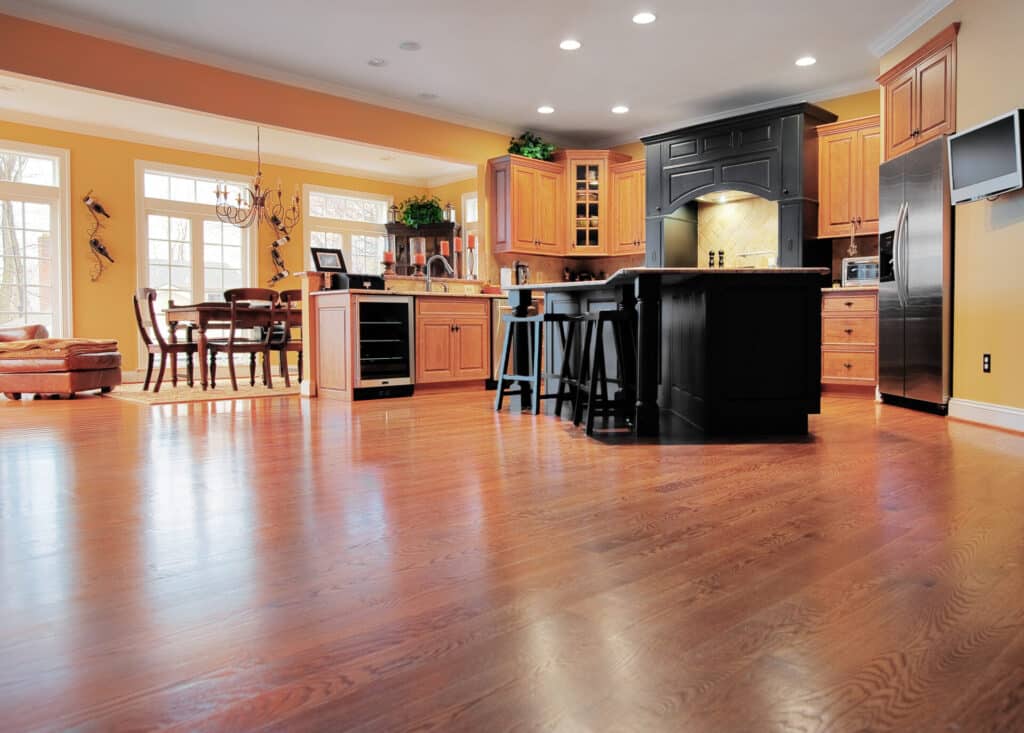
When it comes to kitchen renovations, one of the most important decisions you’ll make is selecting the right flooring. The kitchen is a high-traffic area that experiences spills, stains, and constant foot traffic. Therefore, durability and functionality should be key considerations in your flooring selection. In addition to practicality, you’ll also want to consider the aesthetic appeal and overall design of your kitchen. In this article, we’ll explore some popular flooring options for the kitchen and discuss their advantages and disadvantages.
1. Ceramic Tile:
Ceramic tile is a well-liked choice for kitchen flooring due to its durability and versatility. It’s resistant to scratches, stains, and water damage, making it an excellent option for high-moisture areas like the kitchen. Ceramic tiles are available in a various range of colors, textures, and patterns, letting you to create a unique and visually appealing kitchen floor. Additionally, ceramic tiles are relatively easy to clean and require minimal maintenance. However, they can be cold underfoot, so it might be worth considering using area rugs or installing underfloor heating if you live in a colder climate.
2. Vinyl:
Vinyl flooring has come a long way in terms of design and functionality. It’s affordable, easy to install, and available in a wide range of styles, including tiles, planks, and sheets. Vinyl is water-resistant and highly durable, making it an excellent choice for kitchens prone to spills and heavy foot traffic. It is also comfortable underfoot and provides good insulation against noise. However, some vinyl flooring options may not be as heat-tolerant as others, and direct sunlight exposure can cause colors to fade over time. Additionally, while vinyl is generally low-maintenance, it can be prone to scratches and tears.
3. Hardwood:
Hardwood flooring is a classic and timeless option for kitchens. It adds warmth and elegance to the living space and can harmonize a variety of kitchen styles and color schemes. Hardwood floors are durable and long-lasting, and with proper maintenance, they can last for decades. Additionally, hardwood floors are relatively easy to clean and can be resurfaced if they become scratched or dull over time. However, one major consideration with hardwood floors in the kitchen is their susceptibility to water damage. Spills should be cleaned up immediately to avoid warping or staining the wood. It’s also important to note that hardwood floors can be quite expensive, so if you’re on a tight budget, hardwood may not be the best option.
4. Laminate:
Laminate flooring offers the appearance of hardwood or stone at a more affordable price point. It is made of several layers of synthetic materials that are fused together, providing durability and resistance to moisture, scratches, and stains. Laminate flooring is relatively simple to set in place and maintain, making it a popular choice for DIY enthusiasts. It is also available in a wide range of colors and finishes, making it easy to find a style that’s suitable to your kitchen design. However, laminate flooring can be susceptible to water damage if not properly sealed, so it’s important to clean up spills promptly. Additionally, while laminate is generally durable, it can be more easily scratched or dented than other flooring options.
5. Cork:
Cork flooring is another eco-friendly option for the kitchen. It’s made from the bark of the cork oak tree, which regenerates itself, making it a sustainable choice. Cork flooring is soft underfoot, providing comfort while standing for long periods in the kitchen. It’s also naturally resistant to mold, mildew, and pests. Additionally, cork has acoustic properties, reducing noise transmission in the kitchen. However, it is worth noting that cork flooring can be susceptible to scratches and indentations. It may also fade over time with exposure to direct sunlight. To maintain its appearance, cork floors need to be resealed periodically.
6. Concrete:
Concrete flooring offers a modern and industrial look to the kitchen. It is extremely durable and can resist heavy foot traffic, making it appropriate for busy households. Concrete floors can be stained, colored, or polished to achieve a unique design. They are also highly resistant to water damage, stains, and scratches. However, concrete can be quite cold and hard, so area rugs or installing radiant heating might be necessary. Additionally, concrete floors require professional installation and may be more expensive compared to other flooring options.
7. Natural Stone:
Natural stones, such as slate, granite, and marble, can create a expensive and stylish look in the kitchen. Each stone type has its own unique beauty, offering a variety of colors, patterns, and textures. Natural stone is highly heat-resistant and durable, making it ideal for kitchen settings. However, it can be quite expensive, and some stone types may require regular sealing to prevent staining and water damage. Natural stone is also heavy and may require additional structural support during installation.
8. Bamboo:
Bamboo flooring is a sustainable and green option for the kitchen. It is made from fast-growing bamboo plants and offers a unique and exotic look. Bamboo flooring is long-lasting and resistant to scratches and stains. It’s also relatively not difficult to clean and maintain. However, bamboo floors can be sensitive to water damage, so spills should be cleaned up promptly. Additionally, depending on the manufacturing process, bamboo floors may vary in quality, so it’s important to choose a reputable supplier.
In conclusion, selecting the right flooring for your kitchen requires careful consideration of both functionality and aesthetics. Ceramic tile, vinyl, hardwood, laminate, cork, concrete, natural stone, and bamboo are all popular options, each with its own advantages and disadvantages. It’s important to assess your specific needs and preferences, taking into account durability, maintenance requirements, budget, and design aspects. Consulting with a professional flooring specialist can also provide valuable guidance in choosing the best flooring option for your kitchen remodeling or renovation.
